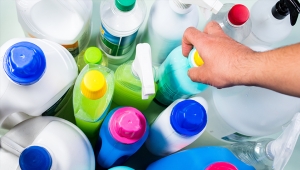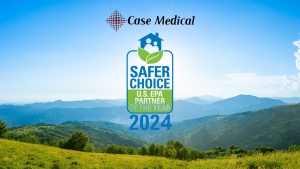Less is Best: Streamlining Instrument Processing
According to OSHA, hazardous chemicals are prevalent in Central Sterile Supply (SPD). Examples include concentrated liquids with extreme pH levels, sterilization liquids and gases, plasma vapors, and other disinfecting liquids and aerosols...
Pennywise and Pound Foolish
When budgets are tight, people sometimes look for quick fixes to save on immediate costs. Unfortunately, they will end up being sorry if what looks like a less expensive product costs more in the long run...
Environmental sustainability is about ecological balance
Having necessary medical devices, supplies and equipment are critical for hospitals and clinics to continue delivering high quality care to patients. The healthcare community relies on foreign companies, especially China, for medical equipment and supplies, even raw materials and spare parts to replenish our factories manufacturing products including medical devices right here in the USA...
Doing Business in a Sustainable and Non-Toxic Way
Every day seems to bring a new natural disaster or calamity, wildfires burning up New Mexico, western reservoirs drained to their lowest levels ever, extreme weather, flooding and landslides around the globe, can it get any worse? In a word, YES, yes it can if we don’t also stop poisoning ourselves with chemicals and products toxic to both humans and the environment.
Perservation Past & Present
Gels can preserve tissue and bioburden under a tough to remove clear coating. Jurassic Park, the book and movie was based on the notion that mosquitos were so well persevered in amber that dinosaur DNA could be recovered after millions of years. Well, pre-cleaning gels work much the same way, after a short time a sticky skin forms on the gel, trapping the debris beneath and becoming virtually impervious to cleaning. Enter the pre-cleaning gel, easy to use, and convenient, made to prevent soil from drying onto used instruments; is it wet or just an illusion?
The Conservation of Energy
Does the idea of the conservation of energy make you think of the gas mileage your car gets, or putting on a sweater during the winter, or the low-power LED light bulbs that make you think you’re going blind...
Case Medical: Now a Seven Time U.S EPA Safer Choice Partner of the Year!
We are so pleased to be selected as a 2024 EPA Safer Choice Partner of the Year for manufacturer/formulator. Our partnership with the EPA extends more than a decade promoting safer, and sustainable instrument chemistries...
Clean Science
If you're curious about how cleaning products work or why cleaning of medical devices is considered the critical first step in the decontamination process, you've come to the right place. We’ve studied the science of cleaning and are pleased to share with you what we learned over the last thirty years, as a U.S. EPA Safer Choice Partner of the Year, in independent laboratory studies, and in our micro lab....
Alkaline Products Can Dissolve Everything, Even the Skin of a Strawberry
Many people still don’t know that fruits and other produce bought from the grocery store are covered with a thin layer of wax to prevent spoilage. Removing the wax is as easy as soaking the produce in a solution of water and baking soda for 15 minutes. The alkaline solution will dissolve the wax, and any pesticides leaving you with safe/healthy produce after a light rinse...
Always In Front of the Curve With Innovation
The news cycle has been dominated by headlines that are talking about AI and it’s potential to reshape the way we live and work. What many people don’t realize is that we have been developing and using machine learning tools at Case Medical long before it was popularized in the news cycle...














